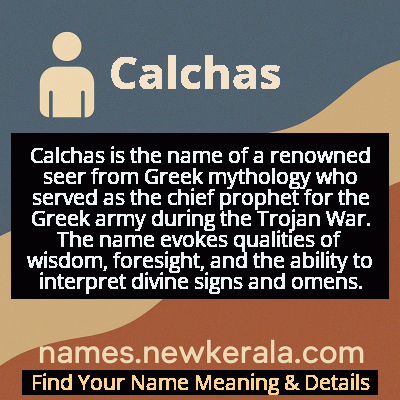Calchas Name Meaning & Details
Origin, Popularity, Numerology Analysis & Name Meaning of Calchas
Discover the origin, meaning, and cultural significance of the name CALCHAS. Delve into its historical roots and explore the lasting impact it has had on communities and traditions.
Name
Calchas
Gender
Male
Origin
Greek
Lucky Number
2
Meaning of the Name - Calchas
Calchas is the name of a renowned seer from Greek mythology who served as the chief prophet for the Greek army during the Trojan War. The name evokes qualities of wisdom, foresight, and the ability to interpret divine signs and omens.
Calchas - Complete Numerology Analysis
Your Numerology Number
Based on Pythagorean Numerology System
Ruling Planet
Moon
Positive Nature
Diplomatic, friendly, artistic, empathetic.
Negative Traits
Over-sensitive, moody, indecisive, prone to self-pity.
Lucky Colours
Green, cream, white.
Lucky Days
Monday.
Lucky Stones
Pearl, moonstone.
Harmony Numbers
1, 3, 4.
Best Suited Professions
Diplomats, mediators, caregivers, artists.
What People Like About You
Cooperative spirit, friendliness, artistic talent.
Famous People Named Calchas
Calchas of Mycenae
Mythological Seer
Predicted the duration of the Trojan War and advised the Greek forces
Calchas (Literary Character)
Fictional Character
Featured in multiple works including Homer's Iliad and Shakespeare's Troilus and Cressida
Calchas (Academic Reference)
Scholarly Subject
Frequently studied as an archetype of ancient divination and prophecy
Name Variations & International Equivalents
Click on blue names to explore their detailed meanings. Gray names with will be available soon.
Cultural & Historical Significance
His role extends beyond mere fortune-telling; he embodies the tension between human agency and predetermined destiny that fascinated Greek thinkers. Calchas also represents the respected position of seers in ancient society, where their interpretations of omens could sway kings and alter the course of wars. His eventual death, predicted by another seer who said Calchas would die when he met a better prophet than himself, adds an ironic layer to his mythological narrative that explores themes of professional rivalry and the limits of human knowledge. The name Calchas continues to symbolize the pursuit of knowledge and the complex relationship between foresight and human action.
Extended Personality Analysis
Individuals named Calchas are typically perceived as analytical, perceptive, and intellectually gifted, reflecting the mythological seer's qualities. They often demonstrate strong intuitive abilities and a tendency to think deeply about problems before arriving at solutions. Like their namesake, they may exhibit a calm demeanor in crisis situations and possess the ability to see patterns and connections that others miss. Their analytical nature makes them excellent problem-solvers, though they might sometimes be perceived as overly cautious or deliberative.
The name suggests someone who values knowledge and wisdom, often pursuing intellectual or scholarly interests. They tend to be observant and detail-oriented, with a natural curiosity about how things work and why events unfold as they do. However, the mythological Calchas's story also suggests potential challenges: a tendency toward perfectionism, occasional arrogance about one's knowledge, and the burden of feeling responsible for predicting outcomes accurately. These individuals often command respect for their insights but may struggle with the weight of expectations that come with their perceived wisdom, making them both admired and somewhat isolated figures in social contexts.
Modern Usage & Popularity
In contemporary times, Calchas remains an exceptionally rare given name, primarily used by classical scholars, mythology enthusiasts, or parents seeking a distinctive name with deep historical roots. Its usage is almost exclusively confined to Greece and academic circles, with minimal presence in global name databases. The name has never ranked in popularity charts in English-speaking countries, maintaining its status as a niche choice. However, it occasionally appears in modern retellings of Greek mythology, fantasy literature, and role-playing games where ancient themes are explored. The name's complexity and strong mythological associations make it more suitable as a middle name or literary reference rather than a common first name in modern society, though it continues to attract those who appreciate its classical heritage and unique character.
Symbolic & Spiritual Meanings
Calchas symbolizes foresight, wisdom, and the human desire to understand and predict the future. The name represents the bridge between mortal knowledge and divine insight, embodying the ancient concept of prophecy as both a gift and a burden. Symbolically, Calchas stands for analytical thinking, pattern recognition, and the ability to interpret signs and omens in everyday life. The name carries connotations of responsibility—the weight of knowledge and the ethical implications of sharing predictions that may influence others' decisions. It also symbolizes the limits of human understanding, as even the great seer Calchas eventually met his match in prophetic ability. The name serves as a reminder that wisdom involves not just seeing what's to come, but understanding the proper context and limitations of that vision, making it a powerful symbol of both human aspiration and humility.

